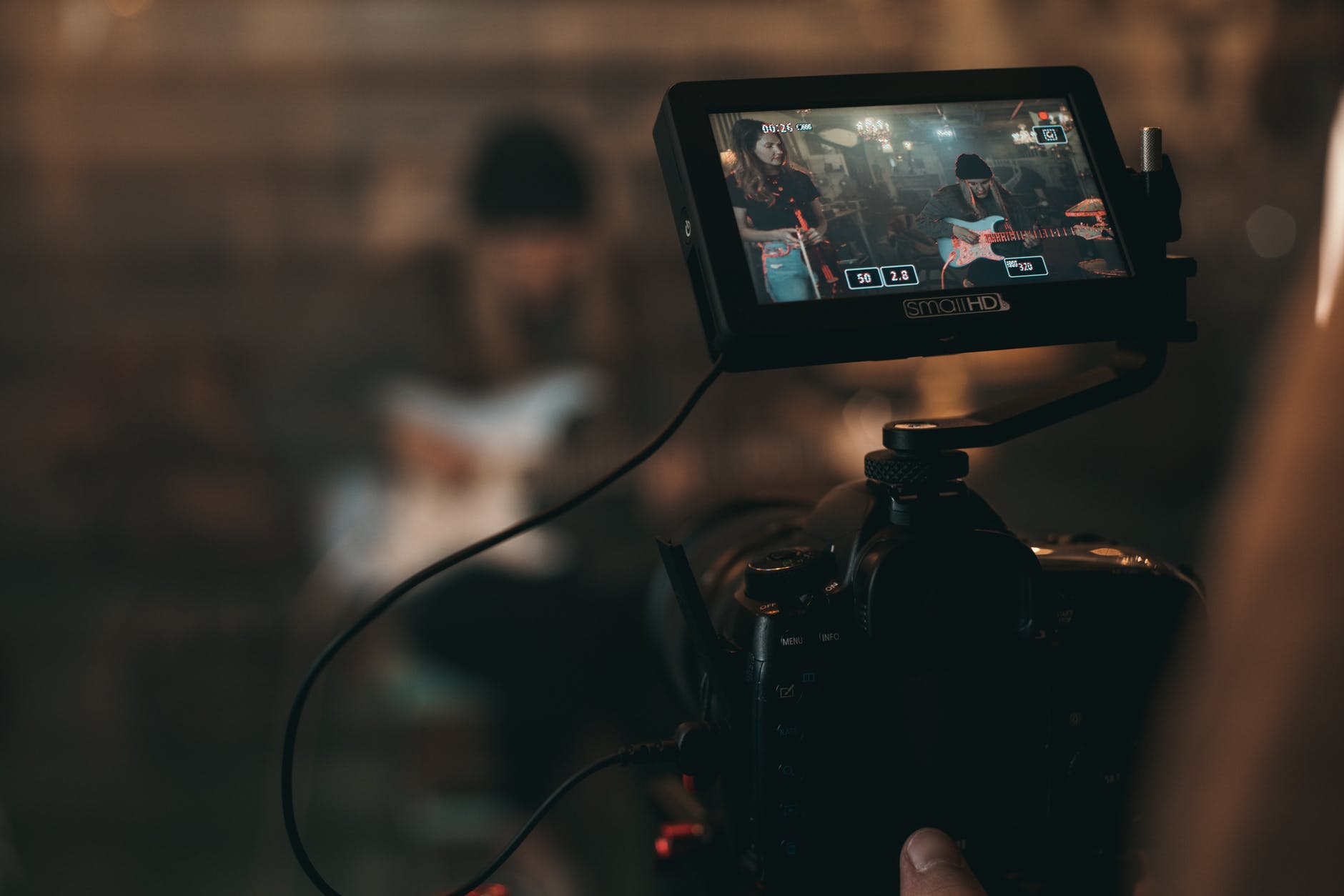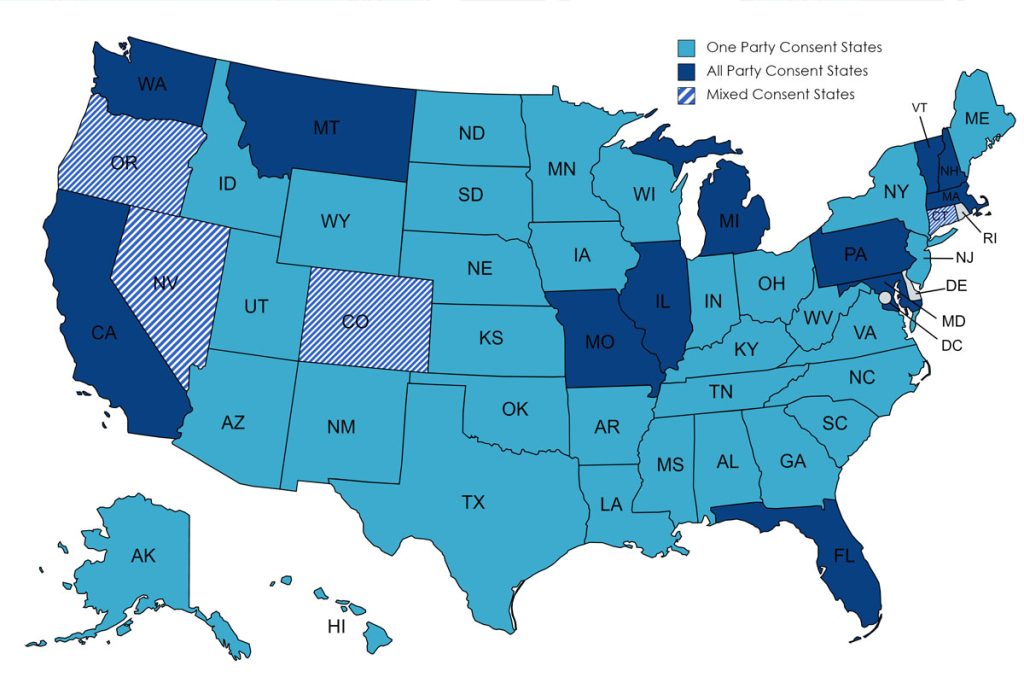
Is it Illegal to Video Record Someone Without Their Permission?
Recording laws in the United States vary significantly from state to state, and whether recording is legal can depend on several factors, including:
- Consent: In some states, known as “one-party consent” states, it is legal to record a conversation or video as long as at least one party consents to the recording. This often means that if you’re participating in the conversation, you can legally record it. However, other states are “two-party consent” or “all-party consent” states, where all parties involved in the conversation must consent to be recorded. This applies to both audio and video recordings.
- Expectation of Privacy: The expectation of privacy is another important consideration. In general, people in public places cannot reasonably expect privacy, so it is usually legal to record them. However, this can depend on the specifics of the situation and local laws. For example, even in public places, it may be illegal to record someone in a situation where they have a reasonable expectation of privacy, such as in a public restroom or changing room. On the other hand, in private settings (like someone’s home or a private office), people generally have a higher expectation of privacy, and it may be illegal to record them without consent.
- Use of the Recording: Even if the recording was legally obtained, how it’s used can also be subject to legal restrictions. For example, using a recording for blackmail, harassment, or other illegal purposes could be a crime. Additionally, publishing a recording might be subject to defamation, libel, or slander laws, or it could potentially violate a person’s right to publicity.
It’s important to note that these are general principles and the specifics can vary significantly depending on state laws and the specifics of the situation. If you’re considering recording a conversation or video, it’s a good idea to understand the relevant laws in your state, and if you’re unsure, to consult with a legal professional.
Do You Have to Have Permission to Video Record Someone?
You’ll have to go into your local state laws to find out more information, but to keep it short and simple, the answer is that it depends. The legality of the recording depends on where the recording takes place, whether audio is recorded, and if there is an expectation of privacy.
Here are some scenarios that you may encounter when videoing without consent:
Video Recording Someone in a Public Park: In most cases this would be a legal recording as there is no expectation of privacy in a public area. However, it should be noted that there is a distinction between being able to legally record someone in a public outdoor place and harassment.
Video Recording Someone in a Private Business Such as a Mall: While there is no expectation of privacy in a public area such as a mall, you will still need to respect the wishes of mall staff. If you are breaking any rule they are legally allowed to remove you from private property.
The Federal Wiretap Act and State Wiretap Laws are built around the recording of audio, so you’ll find the laws regarding recording of sound are more defined than for the recording video. As for location, a good rule of thumb to follow is that if you are in a public place where there is no expectation of privacy then you are allowed to record.
Can I Video Record Someone in Private Without Their Permission
In general, it is illegal to record private audio of conversations between two individuals without the consent of one or both parties. When you’re in a private place the most important thing to understand is whether you are in a one-party, or all-party consent state. You can look at our list of state recording laws – One Party Consent States or All Party Consent States to see which applies to your state.
Can I Video Record Someone Without Their Consent Chart
| One Party Consent States | All Party Consent States | |
| Public Space Video Recording (No Audio) | Yes | Yes |
| Public Space Audio Recording | Yes (Unless there is a reasonable expectation of privacy) | Yes (Unless there is a reasonable expectation of privacy) |
| Private Space | Need consent of one party | Need Consent |
| Police Working in Official Capacity | Yes | Yes |

One Party Consent States
Alabama, Alaska, Arizona, Arkansas, Colorado, District of Columbia, Georgia, Hawaii, Idaho, Indiana, Iowa, Kansas, Kentucky, Louisiana, Maine, Minnesota, Mississippi, Missouri*, Nebraska, Nevada*, New Jersey, New Mexico, New York, North Carolina, North Dakota, Ohio, Oklahoma, Rhode Island, South Carolina, South Dakota, Tennessee, Texas, Utah, Vermont**, Virginia, West Virginia, Wisconsin, and Wyoming
*RecordingLaw.com prefers to err on the side of caution with these states as they have special provisions. Make sure to read the state rules for your specific state.
**Vermont does not have an official law related to call recording, so Federal Law applies. This makes Vermont a one-party consent state.
Two Party Consent States
RecordingLaw.com prefers to err on the side of caution with some of the states marked with a * as they have special provisions that could be interpreted differently depending on each case.
- *Connecticut Recording Laws
- California Audio and Video Recording Laws
- Delaware Recording Laws
- Florida Recording Laws
- Illinois Recording Laws
- Maryland Recording Laws
- Massachusetts Recording Laws
- Michigan Recording Laws*
- Montana Recording Laws
- New Hampshire Recording Laws
- Oregon Recording Laws*
- Pennsylvania Recording Laws
- Washington Recording Laws
Can I Video Record Law Enforcement?

You have a First Amendment right to be able to videotape police officers working in an official capacity. This means that the officer does not have the right to delete your pictures or videos. One thing to keep in mind is that you are not able to break any laws while filming, this includes trespass on private property, obstructing law enforcement officers, or any other laws that may be applicable. It is best practices to film law enforcement officials with your recording device openly displayed (not in secret) as the law may get murkier in some states if you are privately recording audio where there may be an expectation of privacy.
What is a Reasonable Expectation of Privacy?
There are many places where you can expect to have privacy. The most common being when you’re on the phone or in your own home. Places where you would have a reasonable expectation of privacy: In your own home, on the phone, in your vehicle, or in your business office. The law on what constitutes a reasonable expectation of privacy is based on 2 factors that must both be met to qualify as reasonable. The first is whether the subject believed they had privacy, and the second is whether society believes that expectation to be reasonable. An example would be in a Starbucks there is no reasonable expectation of privacy because most patrons can overhear each other. Examples of areas where there is no expectation of privacy: Sidewalks, streets, public buildings, or sporting events.
What is the Federal Video Recording Law?
Due to video being used nation wide for surveillance there are very few restrictions on recording video other then in private areas such as bathrooms. This means that most restrictions for recording video come from the audio recording section. Federal Law for recording audio is derived from the U.S. Code § 2511 which protects wire, oral, and electronic communications. It applies to data stored electronically. Federal Law as it pertains to recording conversations is considered one-party consent where you need the consent of only one party to legally record private conversations.
What is the Law on Secret Video Recordings?
Secret recordings are more of a murky area legally. If you are taking part in the conversation going on they are legal in all one-party consent states. If you are making the recording in all-party consent states the recording may not be admissible.
What is the Law on Video Recording on Private Property?
You can legally record on private property where recordings are allowed if you are respecting the rights of the owner of that private business or property. If there is signage saying ‘no video recording allowed’ or similar then you are not allowed to record. Additionally, if security asks you to stop filming you must stop or you’re at risk of being charged with trespassing.
One Party Consent States
- Alabama Recording Laws
- Alaska Recording Laws
- Arizona Recording Laws
- Arkansas Recording Laws
- Colorado Recording Laws
- District of Columbia Recording Laws
- Georgia Recording Laws
- Hawaii Recording Laws
- Idaho Recording Laws
- Indiana Recording Laws
- Iowa Recording Laws
- Kansas Recording Laws
- Kentucky Recording Laws
- Louisiana Recording Laws
- Maine Recording Laws
- Minnesota Recording Laws
- Mississippi Recording Laws
- Missouri Recording Laws*
- Nebraska Recording Laws
- Nevada* Recording Laws
- New Jersey Recording Laws
- New Mexico Recording Laws
- New York Audio and Video Recording Laws
- North Carolina Recording Laws
- North Dakota Recording Laws
- Ohio Recording Laws
- Oklahoma Recording Laws
- Rhode Island Recording Laws
- South Carolina Recording Laws
- South Dakota Recording Laws
- Tennessee Recording Laws
- Texas Audio and Video Recording Laws
- Utah Recording Laws
- Vermont Recording Laws
- Virginia Recording Laws
- West Virginia Recording Laws
- Wisconsin Recording Laws
- Wyoming Recording Laws
All Party/Two Party Consent States
- *Connecticut Recording Laws
- California Audio and Video Recording Laws
- Delaware Recording Laws
- Florida Recording Laws
- Illinois Recording Laws
- Maryland Recording Laws
- Massachusetts Recording Laws
- Michigan Recording Laws*
- Montana Recording Laws
- New Hampshire Recording Laws
- Oregon Recording Laws*
- Pennsylvania Recording Laws
- Washington Recording Laws